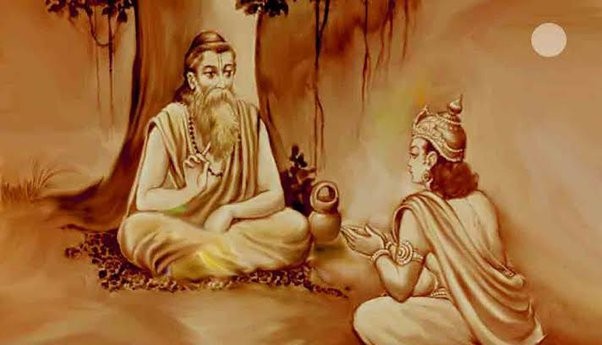In today’s fast-paced world, where technology and materialism dominate our lives, there’s a growing concern about the decline in cultural and moral values in India. From rising corruption to broken family systems, and from a lack of empathy to increasing stress and mental health issues, it feels like something fundamental is missing. Interestingly, if we look back at our history, the Vedas—the ancient scriptures of India—played a pivotal role in shaping a society that was not only spiritually rich but also morally and culturally evolved. Let’s explore why the Vedas are still relevant and how their decline in importance has impacted our society.

The Golden Era: When Vedas Were the Guiding Light
The Vedas, composed thousands of years ago, are more than just religious texts. They are a treasure trove of knowledge, covering everything from science and mathematics to ethics, philosophy, and social harmony. During the Vedic period, society was deeply rooted in these teachings, and the results were remarkable.
- Strong Moral Fabric: The Vedas emphasized values like truth (Satya), non-violence (Ahimsa), and duty (Dharma). People lived with a sense of responsibility toward their families, communities, and nature. For example, the concept of Vasudhaiva Kutumbakam (the world is one family) promoted unity and global harmony.
- Scientific Advancements: Did you know that many modern scientific concepts, including the idea of zero, the solar system, and even advanced medical practices like Ayurveda, have their roots in the Vedas? Ancient India was a hub of knowledge and innovation because people respected and studied these texts.
- Social Harmony: The Vedas promoted a balanced way of life. For instance, the Purushartha framework—Dharma (duty), Artha (wealth), Kama (desire), and Moksha (liberation)—taught people to balance material and spiritual pursuits. This ensured that society was both prosperous and ethical.
The Decline of Vedic Influence: Where Did We Go Wrong?
Over time, as India faced invasions, colonization, and the pressures of modernization, the importance of the Vedas began to fade. While progress and change are inevitable, the loss of Vedic wisdom has left a void in our cultural and moral framework. Let’s see how:
- Erosion of Family Values: In the Vedic era, families were the cornerstone of society. Respect for elders, strong bonds, and collective decision-making were the norms. Today, nuclear families, individualism, and generational conflicts are on the rise. The Vedic concept of Grihastha Ashrama (householder stage) emphasized family responsibilities, which kept society stable.
- Rise in Corruption and Greed: The Vedas taught that wealth (Artha) should be earned ethically and used for the greater good. However, today, the pursuit of money often overshadows moral values. Corruption, scams, and unethical practices have become commonplace.
- Environmental Degradation: The Vedas revered nature as divine. Rivers, trees, and animals were worshipped, and sustainable living was a way of life. Fast forward to today, and we’re grappling with pollution, deforestation, and climate change. The disconnect from Vedic teachings has cost us dearly.
- Mental Health Crisis: The Vedas emphasized inner peace and self-realization. Practices like yoga and meditation, rooted in Vedic wisdom, were tools for mental well-being. In contrast, modern life is filled with stress, anxiety, and depression, as people chase external validation over inner fulfillment.
Relevance of Vedas in Modern India
The good news is that it’s never too late to reconnect with our roots. The Vedas aren’t just ancient texts; they are timeless guides that can help us navigate the challenges of modern life. Here’s how:
- Restoring Morality: By revisiting Vedic teachings, we can rebuild a society based on honesty, compassion, and integrity. For instance, the concept of Dharma can remind us of our duties toward others and the planet.
- Balancing Tradition and Modernity: The Vedas don’t reject progress; they encourage a balanced approach. We can embrace technology and development while staying true to our cultural and ethical values.
- Promoting Mental Well-being: Practices like meditation, yoga, and mindfulness, all rooted in the Vedas, can help combat stress and improve mental health.
- Environmental Consciousness: The Vedic respect for nature can inspire us to adopt sustainable practices and protect our environment.
Let’s Bring Back the Vedic Wisdom
India is at a crossroads. While we’ve made incredible strides in technology and economy, we’re losing the very essence of what made us great—our cultural and moral values. The Vedas offer a roadmap to a harmonious and fulfilling life.
Let’s take small steps:
- Teach our children about Vedic values like truth, compassion, and respect.
- Incorporate Vedic practices like yoga and meditation into our daily routines.
- Celebrate festivals and traditions that connect us to our roots.
By embracing the wisdom of the Vedas, we can create a society that’s not only prosperous but also morally and culturally rich. After all, as the saying goes, “A nation that forgets its past has no future.” Let’s honor our heritage and build a brighter tomorrow.
What are your thoughts on the relevance of the Vedas in today’s world? Share your views in the comments below! Let’s start a conversation about preserving our cultural and moral values.
Pandit Brahm Dev Vedalankar Ji is a revered Arya Samaj scholar known for his deep Vedic knowledge and dedication to promoting the teachings of Maharishi Dayanand Saraswati. His profound wisdom, inspiring discourses, and commitment to truth and equality have made him a guiding light for many, fostering spiritual growth and social harmony.


